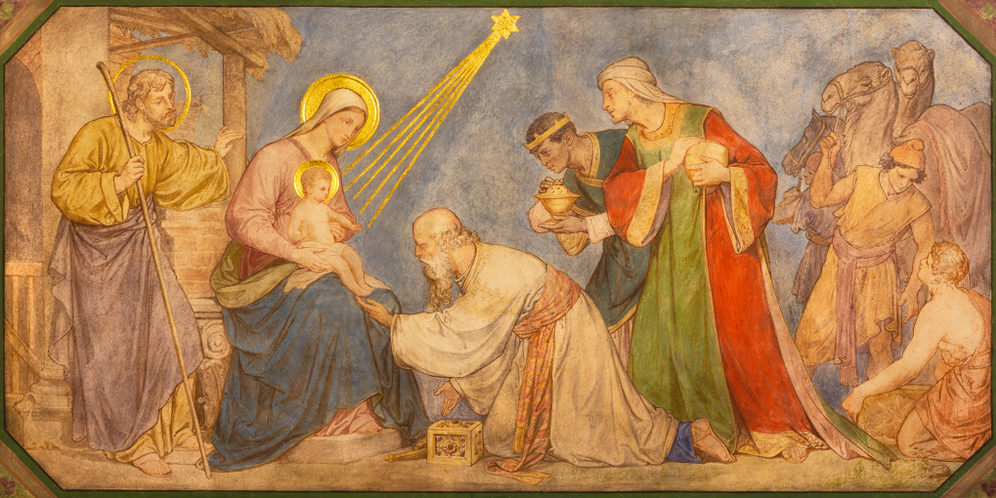
Emmanuel, God Has Come
Tis the season. As we come to another Advent season, we are prompted once again to pause and meditate on our faith’s spectacular mystery: we confess that the Son of God, without ceasing to be God, became man. The Word was made flesh to dwell among us (Jn 1:14). The author of the story has written himself into it as a character. In his flesh, Jesus has translated God for us, in human form, so that we might know him. He has come to redeem us, at long last, after the world lay long “in sin and error pining.”
The mystery of the incarnation is never a reality we move past as Christians, and in a very real way, we celebrate it every Lord’s Day. When we come together to worship Jesus, we are worshipping the incarnate one. In his flesh, Jesus has translated God for us, in human form, so that we might know him. Click To TweetWe are worshipping Emmanuel—God with us—who came and lived and died and was raised. Yet there is something special about molding our yearly calendar around the gospel. We celebrate the incarnation of Christ in this season, and in the Spring, we celebrate the death and the resurrection of Christ. Cycling the gospel story into our yearly calendar is an aid for us; it enables us to avoid the mistake of abstracting one part of the gospel story from others. The Son of God came as a babe, but he did not stay that way. He grew. He lived. He obeyed. He died. He was buried. He was raised. And he will come again. And we remind ourselves of all of this year after year, in this space we occupy: between two Advents.
This is why I wrote Emmanuel, God Has Come. I pray the song becomes useful for you in this Christmas season, as you meditate on the mercy of God in the incarnation.
Eternally begotten Son
Immutable as God above
Creator of the universe
Became a child in humble birth
The idea behind this verse is to key in on the seeming paradox of the incarnation. The Son of God is the Son eternally—never was there a time that the Son was not begotten of the Father. The theological term for this is “eternal generation.” The Father is eternally the Father of the Son, and the Son is eternally the Son of the Father. The God who acted in time in the incarnation is the Triune God—one God in three persons, Father, Son, and Spirit.
The seeming paradox in all this is that this Triune God is characterized by certain attributes. One of which is immutability (which means, “unchangeability”). God cannot change (Numbers 23:19; Malachi 3:6; James 1:17; Hebrews 6:18). One theologian, Herman Bavinck, goes so far as to say that “If God were not immutable, he would not be God” (Reformed Dogmatics 2.154).The great mystery of the incarnation is that the Son of God, without ceasing to be God (i.e., without ceasing to be this immutable God) became man. Click To Tweet The great mystery of the incarnation is that the Son of God, without ceasing to be God (i.e., without ceasing to be this immutable God) became man. If God does not change, how can we say that the Second person of the Trinity, “truly God of truly God,” became anything at all, let alone that he became man?
The answer to this question is the doctrine we call the “hypostatic union.” The union of Christ’s two natures. A key characteristic of the divine nature is unchangeableness. Only one being in all existence has that nature: the Triune God. As such, the Son of God as God is unchangeable. His divine nature doesn’t change. Not even the incarnation changed his divine nature. So what happened in the incarnation then? The Son of God—the second person of the Trinity—assumed to himself another nature. He added nothing to his divine nature, but rather assumed to his person a human nature. Which means that the mystery of the incarnation is that a divine person of the Trinity now has two distinct natures! His divine nature never stopped being divine—bearing even the attribute of immutability—but now he has a human nature, which is fully and truly human.
All this is what the early church Christians were trying to articulate in the Definition of Chalcedon. The Son humbled himself by taking on a human nature without forfeiting his untouched, immutable, eternal divine nature yet in such a way that the two natures remain “without confusion, without change, without division, and without separation” (Chalcedon).
From heav’n he speaks, the earth his words
From heav’n he came, the Word on earth
From heav’n he came to seek his bride
To heav’n he’ll bring her to his side
Obviously, there is a play on words here. The earth was spoken into existence by God (Gen 1; Jn 1:1-3; Heb 1:1-3). We are his spoken words. Martin Luther said it well:
He does not speak grammatical words; He speaks true and existent realities. Accordingly, that which among us has the sound of a word is a reality with God. The sun, moon, heaven, earth, Peter, Paul, I, you, etc. –we are all words of God… We, too, speak, but only according to the rules of language; that is, we assign names to objects which have already been created. But the divine rule of language is different, namely; when He says: ‘Sun, shine,’ the sun is there at once and shines (Luther’s Words, vol. 1 Lectures on Genesis: chapters 1-5).
So the Word speaks the earth into existence. And then Word comes to dwell on that earth. He, the Word, enfleshes himself as the Word among his words.The second person of the Trinity, in his divine nature, upholds this universe together, even the manger in which he lay! Click To Tweet
The grammar is also important in this verse. It says that Christ speaks, and that the earth is his words. Not that he spoke. That is, he continually sustains the universe by his powerful word (Col 1:15-18; Heb 1:1-3). And, since this is an activity of God, and the Son did not cease to be God when he became man, he kept speaking the universe together when he entered into time and space in the incarnation. This should blow our minds! The second person of the Trinity, in his human nature, lay in manger. The second person of the Trinity, in his divine nature, upholds this universe together, even the manger in which he lay! John Calvin describes it like this: the Son of God came from heaven without leaving heaven.
And what did he come from heaven for? He came to seek his bride: the Church. He came to redeem his people.
Emmanuel, God has come
One with the Father and Spirit above
The infinite now the finite King
Comes to deliver from death’s stingEmmanuel, God has come
Born under law, a curse for us
United in the Christ we die
United in the Christ we rise
This is the heart of the gospel (Gal 4:4-7). The infinite becomes an infant. To grow up, to live the righteous life his people could never live, and to die the atoning death they deserve, in order to bring them safely into the fellowship of God. Now they can face death without fear or dread because its sting is removed. Death no longer dispatches us to damnation and judgment, but rather dispatches us to glory; to be swallowed up into God’s triune love. He came as a baby to live and die and rise. He came as a baby, born under the law, to redeem those of us who are enslaved under its oppressive condemnation. When we are united to Christ by faith, we are united to the one who has blazed the trail out of slavery to the condemnation of the law with his life, death, and resurrection.
The Word was made flesh, we have seen
The glory, the truth, the grace he brings
Truly divine, now truly man
Now man can touch the great I Am
This verse deals with the revelatory nature of the incarnation. Christ came to reveal God to us. The fourth-century Church father Athanasius says this brilliantly:
For since human beings, having rejected the contemplation of God and as though sunk in an abyss with their eyes held downwards, seeking God in creation and things perceptible, setting up for themselves mortal humans and demons as gods, for this reason the lover of human beings and the common Savior of all, takes to himself a body and dwells as human among humans and draws to himself the perceptible senses of all human beings, so that those who think that God is in things corporeal might, from what the Lord wrought through the actions of the body, know the truth and through him might consider the Father (Athanasius, On the Incarnation, ch.15).
What’s he saying? He’s saying that God, recognizing our inability to lift our gaze up from the created order to heaven, came down from heaven to the created order to stand at our eye level. He’s saying, “Since human beings couldn’t seem to stop worshiping creation instead of the Creator, the Creator became a creature to accommodate our limitations!” This is what I do when I need to get my son’s attention while he is preoccupied with making a mess all over the ground: I drop down to the ground. I stoop to bring myself to his eye level.
We’re hid in the rock of ages
Sealed within a triune promise
The Son of God made one of us
That we might be made one with God
We must remember that the very thing that secures our salvation is the God-man’s Godness and manness. This is our God. This is who we worship this Christmas season. This is who we worship with our whole lives, now and forevermore. Amen. Click To TweetIn order for the Son of God to win us a righteousness that we could bear as our own, he had to become one of us. The obedience of a super-creature, a non-human, may be impressive to us humans, but it wouldn’t be good news for us. It wouldn’t mean a thing, because we couldn’t bear it—we aren’t super creatures. Additionally, the death of a super-creature wouldn’t be any more effective in atoning for our sins than the animal sacrifices of the Old Testament were (Heb 10:11-14). We needed for Christ to be a new Adam, a new human, a new head of humanity, otherwise we couldn’t benefit from anything he did.
But a mere human’s life and death could never be good enough to secure our salvation, because mere humans are changeable. Our salvation is only eternally secure if it is rooted in a being who is eternal. Thus, the God-man. The Son of God came to us to bring us to himself. He fetches us with his humanity, he safeguards us with his divinity. Think about God’s triune, divine, immutable nature as the impenetrable fortress that we are sealed into when we are united to the God-man by faith.
This is our God. This is who we worship this Christmas season. This is who we worship with our whole lives, now and forevermore. Amen.

